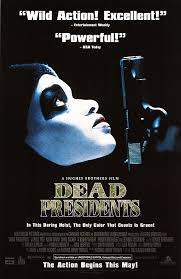Dead Presidents
Film Reviewed by Ted Prigge
 DEAD PRESIDENTS (1995)
DEAD PRESIDENTS (1995)
![]()
![]()
![]() (out of a possible
(out of a possible ![]()
![]()
![]()
![]() )
)
Directors: Allen and Albert Hughes
Writer: Michael Henry Brown (based on a story by Allen and Albert Hughes and Michael Henry Brown)
Starring: Lorenz Tate, Keith David, Chris Tucker, N’Bushe Wright, Freddy Rodriguez, Bokeem Woodbine, Rose Jackson
"Dead Presidents" is a film that yearns for greatness, to be taken as an enigmatic condemnation of American warfare the way a film like Hal Ashby’s "Coming Home" or Michael Cinimo’s "The Deer Hunter" is. It has an epic kind of feel to it, a big budget, young stars playing people who are haunted by a war they didn’t really have to fight, and people who are systematically beaten down by the system. It features lots of heartache, a downer of an ending, and even some nasty bloodshed. But in the end, it just feels like they forgot to add something in there, but it still comes out as a pretty good film nonetheless. It’s just not going to be "The Deer
Hunter."
"Dead Presidents" tells the story of Anthony (Lorenz Tate), a young man growing up in Brooklyn in the late 60s, and is presented in three parts: a coming of age section, a Vietnam and its impact section, and a big heist section. The film starts off wonderfully, and for the first half hour shows us the younger life of the character, setting up his character, establishing some supporting roles, including Kirby (Keith David), his big father figure and owner of the local small-time booking agency to which Anthony works for; Skip (Chris Tucker), a motorcycle-mouthed pal of Anthony; and Juanita (Rose Jackson), who dates and sleeps with him. But Anthony yearns for different things than college, and soon enlists in the army and is soon sent to ’Nam, where he fights for years upon years (with Skip in his platoon, of course). When he finally goes home, he meets his son from he and Juanita’s one night of bliss before he went off to war, and soon has to marry her and get a job. But times are tough, and soon Anthony’s life is falling apart. Desperate for cash, he gets together a group to do a heist on an armored truck, including Kirby, an old war pal turned preacher, and Juanita’s sister, Delilah (N’Bushe Wright), now a radical against the government. Of course, this is only brings him more problems.
The chief problem the film has is the lack of details about everything, especially surrounding the heist, which is a fantastically executed, visceral experience that feels cheap once you realize that these characters have no real reason for being there in the first place. What’s Delilah doing there anyway? What motivation does she have for picking up two revolvers and capping a cop? At least Anthony and Skip have had war experience, where they were forced to kill men they barely knew in cold blood. But still, why is Anthony doing a big heist anyway? The film’s exclusion of these details in this part, and in basically all parts, makes it feel like there’s something missing.
What the film does well, though, is paint an intriguing portrait of people who were coaxed into a war, then spit out by the government, then screwed over again by the same people. This kind of thing undoubtedly happened many times, just not in this extreme way. But the film seems too blatant about making this point in its final scenes where a distraught Anthony screams about how the government screwed him over. Maybe an exclusion of this shouting would have been more effective. I mean, who wants some film talking down to us anyway?
And the film starts off well, but goes slightly down hill as it goes on. The Vietnam section is very good, very authentic, but maybe a tad nihilistic (what about that scene where that man steps on a land mine?) and slightly clich’d. I’ve seen tons of war movies, and something has to be slightly different other than more graphic violence to distinguish it from the others. And the drama that ensues between Anthony and Juanita never feels very realistic - we never know much about their relationship, and the feud over getting a job feels forced and clich’d.
But the Hughes Brothers can direct a scene or sequence. They have an almost Scorsese-like hypnotism to some of them, and fill the film with an amazing soundtrack of late 60s/early 70s soul and funk that undertone the film with energy and mood. And they can really create sequences that seem very lifelike, filled with lots of human humor, like a scene where Anthony and Juanita are in bed and he discovers she’s been stuffing her bra. Or a scene where Kirby gets into a fight with a man, and the man pulls off his prosthetic leg. And a final scene where cops seem to be coming from everywhere is breathtaking and frightening. If anything, "Dead Presidents" is a film about moments.
In the end, "Dead Presidents" is a failed attempt, but not an awful movie in any respects. I loved how truthful it was in its early scenes, and the fact that it didn’t take an easy route by preaching about how the government persecutes African Americans. This is, after all, a film about how the government screwed over everyone in the war, regardless to race, color, or creed. It’s not that it’s very flawed, but that it doesn’t feel like it’s really finished.

Read More AALBC.com Film Reviews
